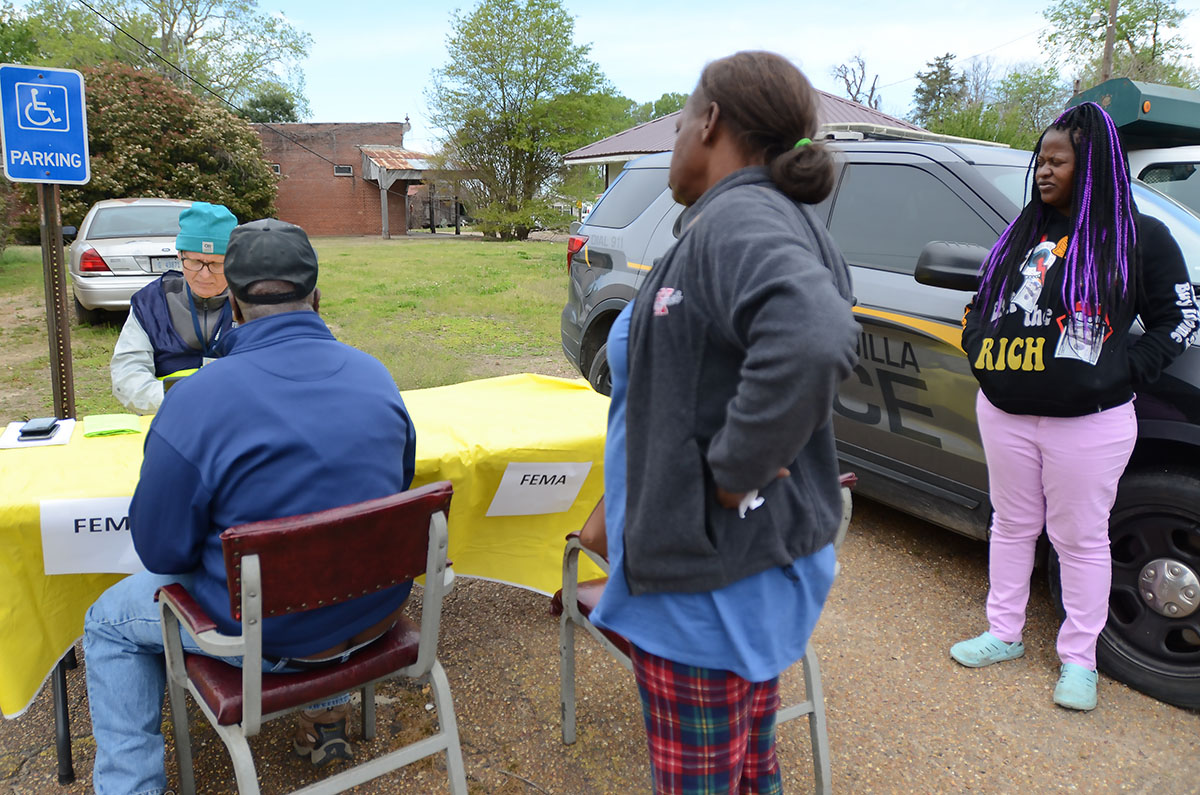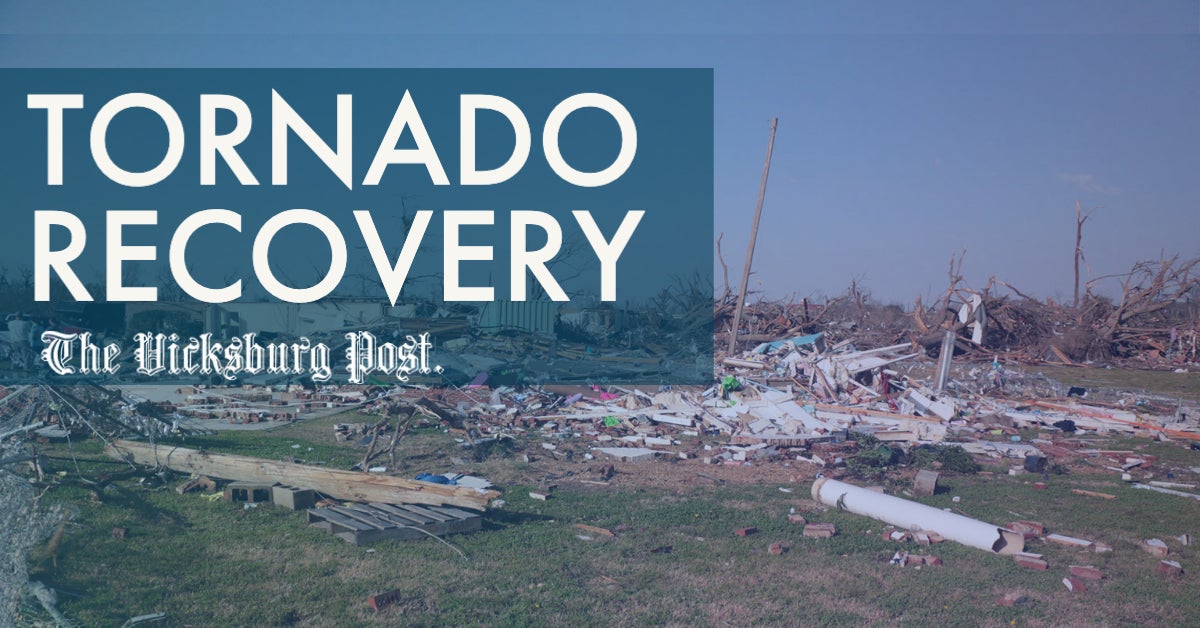When disasters are deemed too small, rural Mississippi struggles to recover
Published 4:15 pm Tuesday, August 1, 2023
By Alex Rozier | Mississippi Today
Under a mystic blend of pink lightning and green sky, Victoria Jackson called her daughter in a panic, warning her of the news: A tornado was on a path toward Rolling Fork.
Her daughter was working that March night at Chuck’s Dairy Bar, a staple of the small, South Delta town. Along with some customers, Jackson’s daughter, Natasha, nestled into one of the coolers in the restaurant.
Hours later, once the storm blew by, Jackson headed to find her daughter, navigating through debris. She found Natasha shaking, in tears. While the tornado tore the rest of Chuck’s into shreds, the cooler and those inside it were safe.
“I thank God that I called her and told her to get down,” Jackson told Mississippi Today.
The tornado killed 14 people in Sharkey County and left Rolling Fork with little resemblance to its prior self. While the Jacksons didn’t lose anyone or anything that night, the reason they were in Rolling Fork in the first place is because, three months prior, they lost everything.

The first tornado the Jacksons survived wiped away their homes last December, tearing up a trailer park where they lived in Anguilla. Victoria, her sister, aunt, cousin and everyone in their families lost their homes, among five total that were destroyed. About 20 members of the family had to relocate a few miles down Highway 61 to a motel in Rolling Fork. Many of them, including Victoria, are still there.
As is often the case for rural disaster survivors, the damages they endured were too small to trigger crucial federal aid. Victoria didn’t have home insurance and lost her job after the storm. Now, nearly six months later, her family hasn’t seen a cent of government disaster aid, and are instead counting on donations to put them in a real home again.
Disaster recovery is already an often difficult and drawn-out process. But for rural, poor towns like Anguilla, a town of 496 people, it’s even tougher.
When people think about disaster recovery, they often think of “FEMA” — the Federal Emergency Management Agency, the national hub of government disaster aid. In reality, though, a vast majority of the country’s disasters don’t receive any FEMA money. They’re what experts call “undeclared” events.
“If you were to aggregate all the losses tied to undeclared disasters, they actually are more costly than typically declared disasters,” said Gavin Smith, a professor of Landscape Architecture and Environmental Planning at North Carolina State University who has helped lead recovery efforts in multiple states.

In Mississippi, nearly a thousand homes have been damaged in undeclared disasters in just the last two years, state records show.
FEMA aid, which comes when the president signs a disaster declaration, is reserved for the larger disasters that leave states needing additional resources. But when a disaster doesn’t meet that threshold, most states, including Mississippi, can’t replicate the kinds of services FEMA can offer.
The programs states receive after a federal declaration include: paying for public infrastructure repairs, putting people in temporary housing, sending direct payments to survivors, expanding safety net programs like food stamps and uninsurance benefits, among others.
Since more often than not, FEMA money is unavailable, many disaster survivors rely on their home insurance to pay for repairs.
But low-income, uninsured families like the Jacksons have to instead depend on the slow, complex network of volunteers and charities. Nonprofits and national religious groups help struggling communities recover all over the country, collecting donations to help rebuild homes, and providing otherwise costly labor for free. But that process takes time.
“If they’re back and recovered within six months, that is like warp speed for these organizations,” said Michelle Annette Meyer, the director of the Hazard Reduction & Recovery Center at Texas A&M University. “At best, they’re looking at a year-long process to get the donations in, confirm the paperwork, get the volunteers and get the materials donated.”
For Sharkey County, where Anguilla and Rolling Fork are, the nonprofit Delta Force handles disaster recovery, finding new homes for survivors after undeclared events. Delta Force’s chairman, Martha Bray, wouldn’t comment on specific cases for privacy reasons, only saying that they’re waiting for enough donations to come in to buy new mobile homes for the Jacksons.
“It’s going to be a long process, that’s all we hear,” Victoria Jackson said.

Last December, just before Christmas and after the tornado destroyed her home, Jackson lost her retail job at a local shop. She said her boss didn’t let her come back despite giving her time off after the storm, and then listed her as having quit, which blocked her from unemployment benefits.
Now, she’s sharing a two-bedroom with her husband and six kids at the Rolling Fork Motel.
Jackson said she received $2,500 in initial donations from local churches and charities. But expenses like food, gas, laundry, and taking care of her children quickly dried that money up. Since her daughter Natasha lost her job at Chuck’s Dairy Bar, the family’s relying on her husband’s truck-driving job to keep them afloat.
After the December tornado, Anguilla Mayor Jan Pearson reached out to state and U.S. representatives, hoping that they could appeal for government assistance. The traces of the tornado were widespread in the small town, damaging businesses and even blowing the roof off the town’s middle school, forcing students to relocate.
“I wrote all of them a letter,” Pearson said. “However, to no avail. We did not get anything.”
County officials, Pearson said, told her the damages didn’t meet the threshold for federal assistance.
“I keep hearing we didn’t meet the threshold,” she said. “Well I asked somebody, ‘Will you tell me what the threshold is?’ No one could tell me what the threshold is.”
For Individual Assistance, the FEMA program that includes housing and other direct support for survivors, there is no set threshold, officials told Mississippi Today.
“It is kind of subjective,” FEMA spokesperson Mike Wade said.
FEMA weighs several factors, such as the degree of damages and the amount of uninsured losses, when deciding if a declaration is justified. The agency categorizes damages into several categories, ranging from “affected” to “destroyed.”
But to local and state officials, FEMA’s criteria is unclear.
In the summer of 2021, for instance, heavy rain flooded 284 homes in the Delta. While local officials pleaded for federal support, the state informed them that not enough of the homes received “major damage,” which FEMA defines as needing “extensive repairs.”
Last March, 33 tornadoes touched down in Mississippi, destroying 42 homes across a dozen counties. The state applied for a federal declaration but was denied.
While there’s no set threshold, the Mississippi Emergency Management Agency estimated that at least 50 homes need major damage to earn a federal declaration.
But the damages from undeclared disasters in just the last couple of years dwarf that number.
Since 2021, 982 homes in the state received some damage from an undeclared natural disaster, according to records from MEMA; 81 of those homes were completely destroyed, and another 203 received major damage.
“When you look at only one of (the undeclared disasters), the damage may be relatively small,” said Andrew Rumbach, a senior fellow at the Urban Institute whose research focuses on rural recovery efforts. “But when you add all those up across the state, it actually cumulatively could be much more important than some of those big events that do get that support.”
Anguilla has just 250 households, according to the Census. Sharkey County Supervisor Jesse Mason, who represents Anguilla, wondered how such a small place could reach the amount of damages that FEMA looks for.
“I don’t know what the magic number is,” Mason said. “I guess maybe it had to tear the whole town up.”

Rural areas have an especially hard time getting FEMA disaster aid, experts say. Mississippi was the fourth most rural state according to a 2010 Census survey, the latest with such data. Sharkey County, home to 3,488 people, is the second least populated county in the state. Neighboring Issaquena County is the first.
“The more rural you are and the more scattered your population and assets are, sometimes those kind of events are the ones that slip under the radar compared to the events where there’s media, for example, to immediately cover it, or there’s political pressure to immediately make declarations,” Rumbach said.
Mississippi has a program that sends money to counties after undeclared disasters. The Disaster Assistance Repair Program, or DARP, works with local nonprofits and sends up to $250,000 for materials to rebuild homes. Meyer, the Texas A&M professor, said that’s more than what most states do after undeclared events.
Since 2018, DARP has helped rebuild 850 homes in 22 counties. But Sharkey County hasn’t applied for DARP funds to help the Anguilla survivors, and officials couldn’t be reached to explain why.
Every county in the state has emergency management officials. But in Sharkey County, there are only two such employees, and both work part-time. Counties with lower tax bases and less capacity to do damage assessments struggle to make the case for disaster declarations, Rumbach said.
One of those two employees, Natalie Perkins, also runs the local weekly newspaper. After the Rolling Fork disaster, which President Joe Biden approved for federal aid, Perkins saw firsthand the difference a declaration makes.
“When you have a declared disaster, everyone comes out of the woodwork to help,” she said. “But when you have an undeclared (event), you don’t get the attention, you don’t get the donations, you don’t get the federal and state funding that you do in a declared disaster. That’s just the bottom line.”

On the morning of Mar. 29, five days after the tornado in Rolling Fork, which also damaged parts of Anguilla, Mayor Pearson scrambled to help FEMA officials set up a booth outside of the town hall.
Pearson sat down with Mississippi Today to talk about the December tornado, the one that displaced the Jacksons. She emphasized that she didn’t want to take away attention from what happened in Rolling Fork. But she couldn’t hold back frustration over the lack of help Victoria Jackson and her family received.
“These people just three months ago lost their homes,” the mayor said. “I can’t equate Rolling Fork with Anguilla. But come on now, people are people, humans are humans. The (Jacksons) left Anguilla and came to Rolling Fork. Now a tornado hit Rolling Fork. These people don’t have anything, and you’re telling them they can’t qualify (for FEMA aid)?”

At the motel, the Jacksons accused the owner of poor treatment, saying he recently raised their weekly rent to $400, and charges extra to wash their sheets. When reached for comment, the motel staff said the owner was out of the country and couldn’t comment. Meanwhile, the Jacksons don’t know how much longer they’ll be able to afford the room.
That Wednesday, while federal officials were in Anguilla, Victoria tried to apply for FEMA aid. They called back later, she said, telling her she’d been denied. While the agency won’t comment on specific cases, FEMA confirmed that aid wasn’t available for people in her situation.
“We just need the help that they’re giving other people,” Jackson said, wondering why she and her family had been left out. “Anguilla is Sharkey County, Rolling Fork is Sharkey County, so all this should be combined together, right? Help for everybody, right?”
This article first appeared on Mississippi Today and is republished here under a Creative Commons license.






